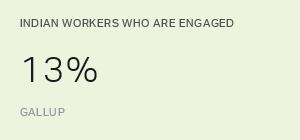WASHINGTON, D.C. -- "Trust is the expectation that arises within a community of regular, honest, and cooperative behavior, based on commonly shared norms, on the part of other members of that community," writes Francis Fukuyama, professor of international political economy at Johns Hopkins University, in his book Trust: The Social Virtues and the Creation of Prosperity. To help gauge levels of trust in a context-specific situation, Gallup asked respondents in 86 countries* whether it was likely that a neighbor, the police, or a stranger would return their lost wallet or valuables to them. Conventional wisdom would suggest that the police would be deemed the most trustworthy, followed by neighbors, and then strangers. Although such perceptions prevail in some countries, respondents in many other nations have different perspectives.
Key Findings
- Austria, Finland, Ireland, New Zealand, Norway, Rwanda, and Switzerland all consistently appear in the top 10 for highest trustworthiness in all three scenarios.
- Police and neighbors are trusted almost equally to return valuables in 21 countries, but in the majority of countries, citizens are more trusting of their neighbors than they are of the police.
- Trust in strangers is the least likely, but it is relatively high in several countries.
Whom Do We Trust?
Because it is their duty to protect people and their personal property, it is not unreasonable to expect that the police would be considered trustworthy. But majorities of respondents believe the police would return a lost wallet to its rightful owner in just 33 countries out of the 86 where the question was asked. This finding underscores a discrepancy between what the police must do as representatives of the law and what they are perceived as likely to do. Respondents' trustworthiness of the police ranges from a high of 98% in Finland to a low of 18% in Guatemala, Kyrgyzstan, and Sierra Leone.
It is also important to note that in 20 countries, at least one-fifth of respondents are unsure as to whether the police would return their lost wallet to them. For example, 37% of respondents in Jamaica and 28% in Azerbaijan say they do not know whether the police would return their valuables; just one-third of respondents in these two countries believe the police would do so.
One of the most interesting patterns that emerge from the results is the recurrence of several countries in the top 10 rankings for highest levels of trustworthiness in all three scenarios. For example, almost all Norwegians (96%) believe the police would return their lost wallet, while 94% say the same about their neighbors, and 36% say this about a stranger. On the other side of the world, New Zealanders express similarly high levels of trustworthiness in the police (93%) and neighbors (94%), and a relatively high trust in strangers (44%).
In a description of the Cultural Map of the World, University of Michigan's Ronald Inglehart argues that societies with strong "self-expression" values (for example, tolerance of different groups and emphasis on civil and political freedoms), "also tend to rank high on interpersonal trust." The Cultural Map identifies some English-speaking countries, Protestant Europe, some countries in Catholic Europe, and Japan as societies with strong "secular-rational" and "self-expression" values. Additionally, in Trust, Fukuyama differentiates between high-trust societies, where trust extends beyond the circle of kinship as individuals are able to "associate with each other" and low-trust societies, where trust is confined to blood relatives, the tribe, or clan.
At the other end of the trustworthiness spectrum, patterns in the list of low-ranking countries for all three scenarios are more difficult to discern. No clear geographical pattern emerges as the list of countries spans several continents. However, many countries that have experienced several years of internal conflict such as Guatemala, Sierra Leone, and Chad and nations that are transitioning from central planning to free market economies such as those of Kyrgyzstan, Russia, and Ukraine tend to be found at the bottom of the rankings. At least for some nations, years of warfare and armed rebellion may have affected people's perceptions of trust in their communities. Furthermore, the Cultural Map identifies countries in the former Soviet Union as having relatively strong "secular-rational" values, but weak "self-expression" values.
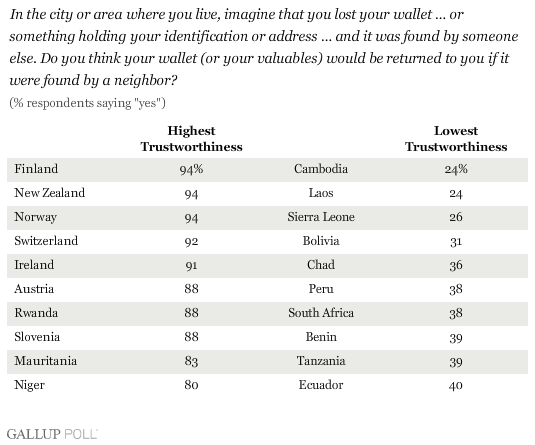
Respondents' trust in their neighbors ranges from a high of 94% in Finland, New Zealand, and Norway to a low of 24% in Cambodia and Laos. In 21 countries (including Ireland, New Zealand, and Rwanda), respondents trust neighbors and the police similarly, while in Singapore, South Korea, and the United Arab Emirates, residents trust the police far more (at by least 15 percentage points) than they do their neighbors.
In addition, one-fifth of respondents in just five countries (Belarus, Indonesia, Jamaica, Ukraine, and Vietnam) say they are unsure whether a neighbor would return their lost wallet. This result indicates that respondents overall appear to be far less conflicted about their neighbors' trustworthiness than that of the police.
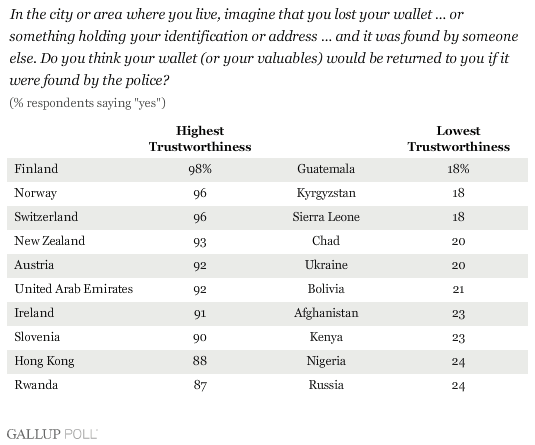
Interestingly, neighbors are more trusted than are the police in 58 out of 86 countries asked this question. In Kenya, for example, 62% of respondents say they believe a neighbor would return their lost wallet to them while only 23% think the police would do the same. Such findings may point to small, cohesive communities where members know most of their neighbors and where life revolves around the community.
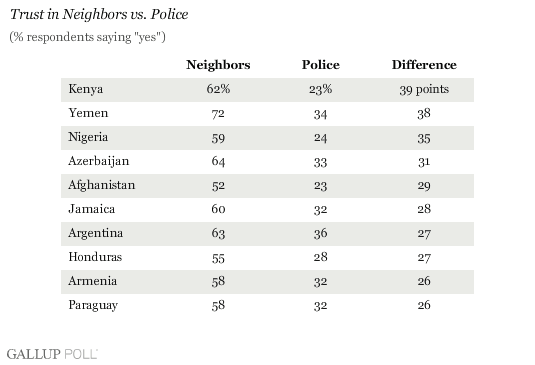
Compared with trustworthiness of the police and that of neighbors, few respondents believe that strangers would return a lost wallet to its rightful owner. However, significant minorities in New Zealand (44%), Switzerland (38%), Norway (36%), and Rwanda (36%) think strangers are likely to do so. Societies with strong "secular-rational" and "self-expression" values, which tend to foster trust, may explain such relatively high levels of trustworthiness of strangers. However, in societies with weaker "secular-rational" and "self-expression" values, such perceived honesty of strangers may also point to small, tightly knit communities where residents are more likely to feel a connection to strangers. But in nearly 80 nations around the world, less than one-quarter of respondents believe strangers would return a lost wallet to its rightful owner. In Cambodia, El Salvador, and Laos, almost no one believes strangers would return valuables.
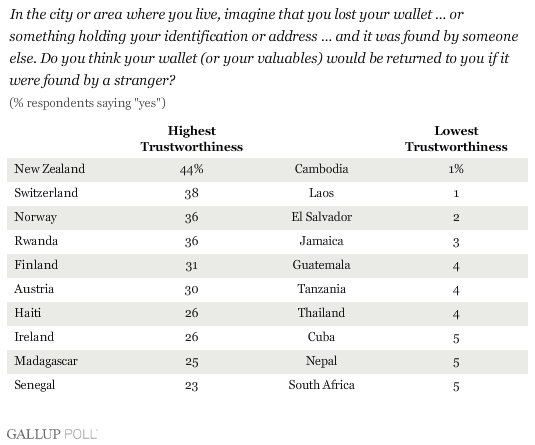
In many countries, large numbers of respondents appear to have mixed views about trusting strangers in their communities to return their valuables. For example, 60% of respondents in Jamaica, 50% in Indonesia, and 45% in Belarus say they do not know whether a stranger would return a lost wallet, while less than 10% of respondents in these three countries believe their valuables, if found by a stranger, would be returned.
Why Does It Matter?
Because trust lies at the core of most human interactions, it forms an integral part of the social capital of nations. The social context of families, friends, neighborhoods, and workplaces and its effect on social capital and well-being have been the focus of extensive research by University of British Columbia's noted economist John Helliwell. At Gallup's recent Global Well-Being Forum, Helliwell presented evidence showing how levels of perceived trustworthiness of neighbors affect life satisfaction in those communities. At the national level, his research shows that both trust and citizen engagement affect social capital.
The Gallup World Poll findings based on the wallet question serve as important indicators of context-specific trust. Poor reputation of the police and even worse, widespread ambivalence about their trustworthiness may present challenges for countries striving to establish democratic institutions and strengthen the rule of law. In a majority of countries surveyed, neighbors are perceived to be more trustworthy than are the local police. Such a finding may indicate that in many communities, most people know their neighbors, at least well enough to vet their integrity.
Perceptions of trustworthiness beyond one's immediate social circle drop significantly in most countries surveyed, even though significant minorities of respondents in a few countries believe strangers can be trustworthy. Some researchers argue that the extent of the "high-trust radius," as in trust between strangers, affects a country's economic performance. Most, if not all, economic activity exists in a social context and depends on people's ability to cooperate with each other. The workplace and its effect on life satisfaction and well-being has also been the focus of Helliwell's research. His findings show that when there are high levels of trust in the workplace, employees feel engaged and report higher levels of life satisfaction. Expanding on his idea of trust, Fukuyama writes that "a nation's well-being, as well as its ability to compete, is conditioned by a single, pervasive cultural characteristic: the level of trust inherent in the society."
*The wallet question was not asked in OECD countries such as the United States, Canada, and Japan.
|
In the city or area where you live, imagine that you lost your wallet … or something holding your identification or address … and it was found by someone else. Do you think your wallet (or your valuables) would be returned to you if it were found by… |
|||
|
|
|
|
|
|
|
(% respondents saying "yes") |
||
|
|
Neighbor |
Police |
Stranger |
|
Afghanistan |
52 |
23 |
6 |
|
Algeria |
74 |
64 |
13 |
|
Angola |
60 |
37 |
9 |
|
Argentina |
63 |
36 |
18 |
|
Armenia |
58 |
32 |
21 |
|
Austria |
88 |
92 |
30 |
|
Azerbaijan |
64 |
33 |
8 |
|
Belarus |
49 |
33 |
6 |
|
Benin |
39 |
36 |
13 |
|
Bolivia |
31 |
21 |
7 |
|
Botswana |
49 |
56 |
9 |
|
Burkina Faso |
65 |
53 |
16 |
|
Burundi |
60 |
35 |
22 |
|
Cambodia |
24 |
27 |
1 |
|
Cameroon |
44 |
33 |
12 |
|
Chad |
36 |
20 |
14 |
|
Chile |
54 |
56 |
7 |
|
Colombia |
65 |
58 |
18 |
|
Costa Rica |
63 |
45 |
8 |
|
Cuba |
57 |
47 |
5 |
|
Cyprus |
80 |
82 |
11 |
|
Dominican Republic |
57 |
33 |
8 |
|
Ecuador |
40 |
29 |
6 |
|
El Salvador |
50 |
40 |
2 |
|
Estonia |
70 |
60 |
12 |
|
Ethiopia |
63 |
44 |
10 |
|
Finland |
94 |
98 |
31 |
|
Georgia |
62 |
44 |
6 |
|
Ghana |
57 |
50 |
14 |
|
Guatemala |
41 |
18 |
4 |
|
Haiti |
67 |
57 |
26 |
|
Honduras |
55 |
28 |
7 |
|
Hong Kong |
79 |
88 |
23 |
|
Indonesia |
55 |
48 |
8 |
|
Ireland |
91 |
91 |
26 |
|
Jamaica |
60 |
32 |
3 |
|
Kazakhstan |
46 |
29 |
9 |
|
Kenya |
62 |
23 |
5 |
|
Kuwait |
78 |
75 |
23 |
|
Kyrgyzstan |
41 |
18 |
6 |
|
Laos |
24 |
26 |
1 |
|
Latvia |
56 |
39 |
8 |
|
Lithuania |
59 |
49 |
8 |
|
Madagascar |
56 |
53 |
25 |
|
Malawi |
51 |
51 |
13 |
|
Malaysia |
67 |
60 |
11 |
|
Mali |
75 |
54 |
20 |
|
Mauritania |
83 |
62 |
22 |
|
Moldova |
50 |
32 |
10 |
|
Mozambique |
56 |
47 |
8 |
|
Nepal |
51 |
26 |
5 |
|
New Zealand |
94 |
93 |
44 |
|
Nicaragua |
45 |
43 |
7 |
|
Niger |
80 |
59 |
19 |
|
Nigeria |
59 |
24 |
13 |
|
Norway |
94 |
96 |
36 |
|
Panama |
51 |
42 |
11 |
|
Paraguay |
58 |
32 |
11 |
|
Peru |
38 |
30 |
6 |
|
Phillipines |
51 |
44 |
15 |
|
Portugal |
76 |
77 |
21 |
|
Puerto Rico |
69 |
64 |
10 |
|
Russia |
48 |
24 |
9 |
|
Senegal |
73 |
69 |
23 |
|
Sierra Leone |
26 |
18 |
10 |
|
Singapore |
59 |
83 |
15 |
|
Slovakia |
62 |
50 |
9 |
|
Slovenia |
88 |
90 |
23 |
|
South Africa |
38 |
34 |
5 |
|
South Korea |
60 |
77 |
21 |
|
Sri Lanka |
46 |
40 |
6 |
|
Switzerland |
92 |
96 |
38 |
|
Taiwan |
69 |
75 |
16 |
|
Tajikistan |
48 |
31 |
9 |
|
Tanzania |
39 |
25 |
4 |
|
Thailand |
46 |
49 |
4 |
|
Togo |
57 |
48 |
19 |
|
Trinidad and Tobago |
53 |
37 |
9 |
|
Uganda |
56 |
36 |
7 |
|
Ukraine |
45 |
20 |
6 |
|
United Arab Emirates |
77 |
92 |
15 |
|
Uruguay |
70 |
52 |
19 |
|
Vietnam |
54 |
60 |
9 |
|
Zambia |
49 |
36 |
12 |
|
Zimbabwe |
57 |
50 |
19 |
Survey Methods
Results from the Gallup World Poll are based on telephone and face-to-face interviews conducted throughout 2006. Randomly selected sample sizes typically number 1,000 residents, aged 15 and older, in the 86 countries polled. For results based on samples of this size, one can say with 95% confidence that the maximum error attributable to sampling and other random effects is ±3 percentage points. In addition to sampling error, question wording and practical difficulties in conducting surveys can introduce error or bias into the findings of public opinion polls.
